KnowledgeConf - took off or not?
In April, we held the first professional conference on knowledge management in IT companies. There were a lot of reports with a large number of practical cases for those who were "pent".
Under the cut, a look at the event through the eyes of a member of the program committee, conference speaker and a simple participant: about top reports, a heavy share of the speaker and practical chips that we managed to get for ourselves from the event.

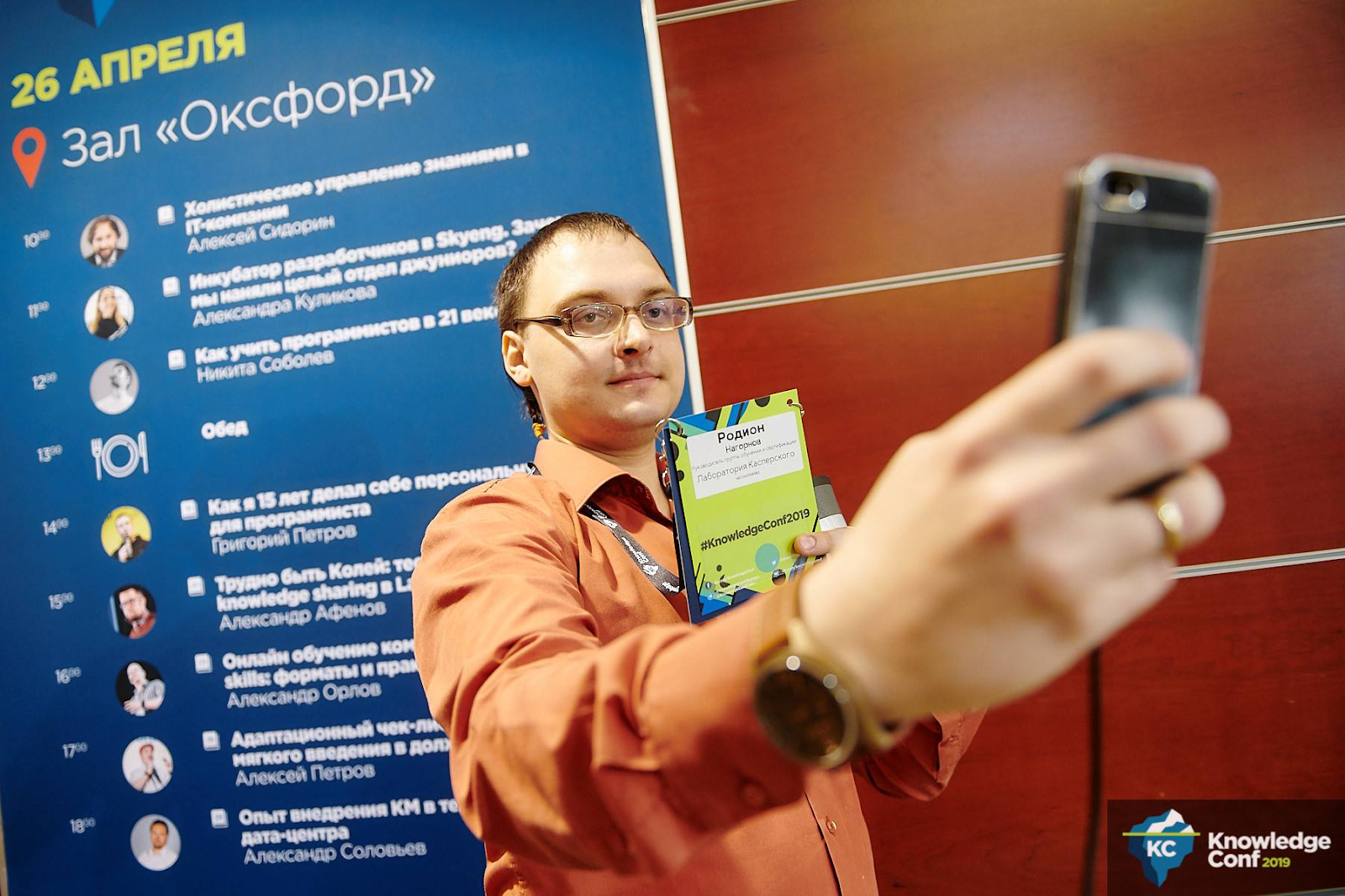
- Did the public interest in the conference live up to your expectations?
It so happened that for me it was the third conference on knowledge management in three weeks, so there is nothing to compare. I will say this: the interest of the IT audience on this topic exceeded my expectations, since the attendance of Knowledge Conf turned out to be much higher than the previous two conferences positioned by their organizers for a wider audience.
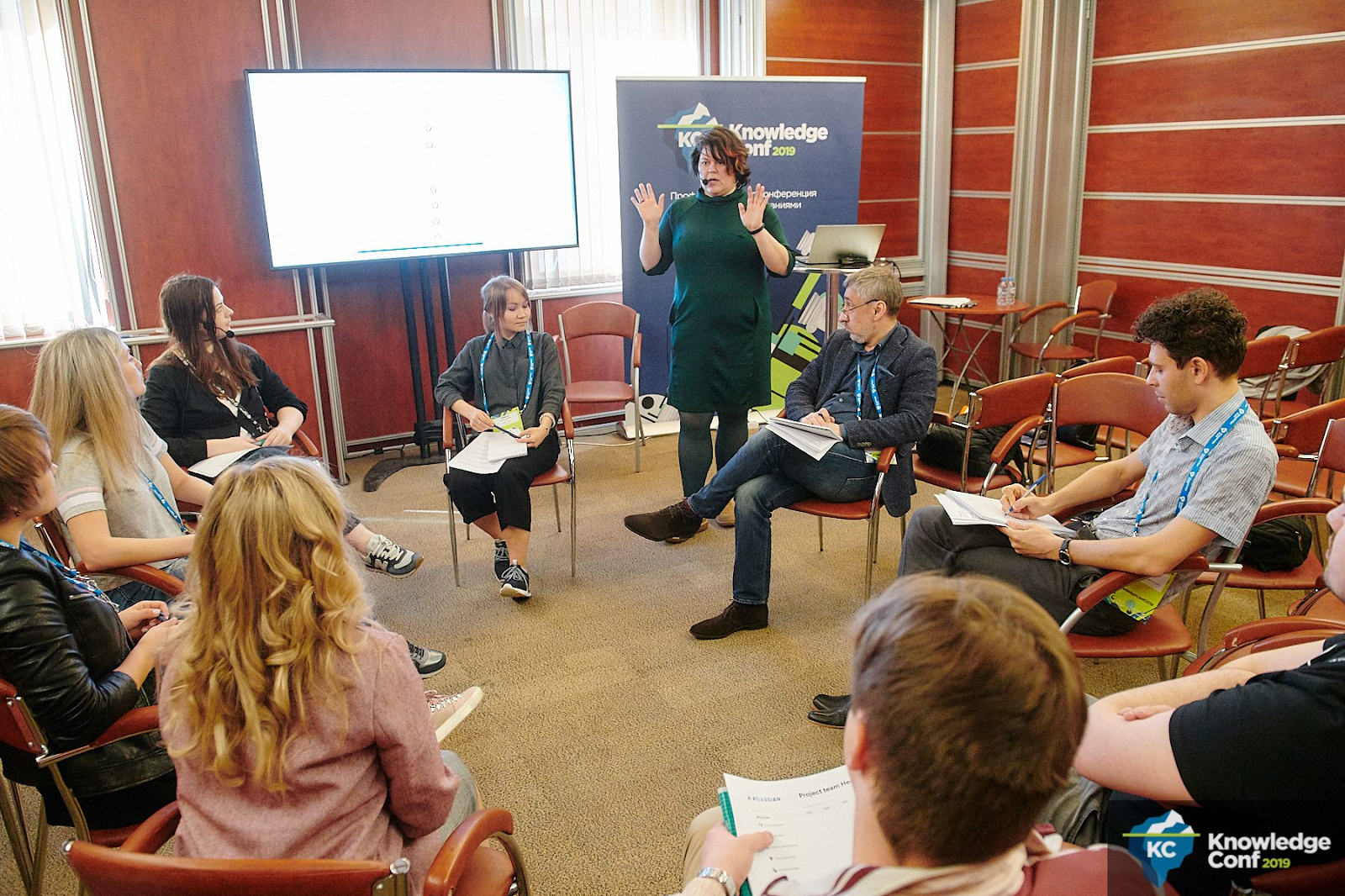
In my personal opinion, knowledge management is a very important process in any company. What can we say about IT, where everything changes at a tremendous speed: from programming languages to personnel. And I am very glad that so many colleagues share this opinion.
- How would you rate the maturity of the entire knowledge management industry in our country?
Large corporations in the public sector, the oil industry, have a fully mature knowledge management process, actively cooperate with foreign leaders, and learn from experience. They have a lot to learn. In the commercial segment, one cannot say for sure. Very heterogeneous. There is a CROC close to ideal, for example. But this is rather the exception. For the most part, companies are just beginning to realize that knowledge is their key capital, that developing knowledge sharing processes is vital for success in a rapidly changing environment. What is better for the whole company to learn from one mistake than to lose money on the same mistakes of each department.
It seems to me that the emergence of a separate conference on knowledge in IT is a kind of marker that the knowledge management industry will soon see a leap in development.
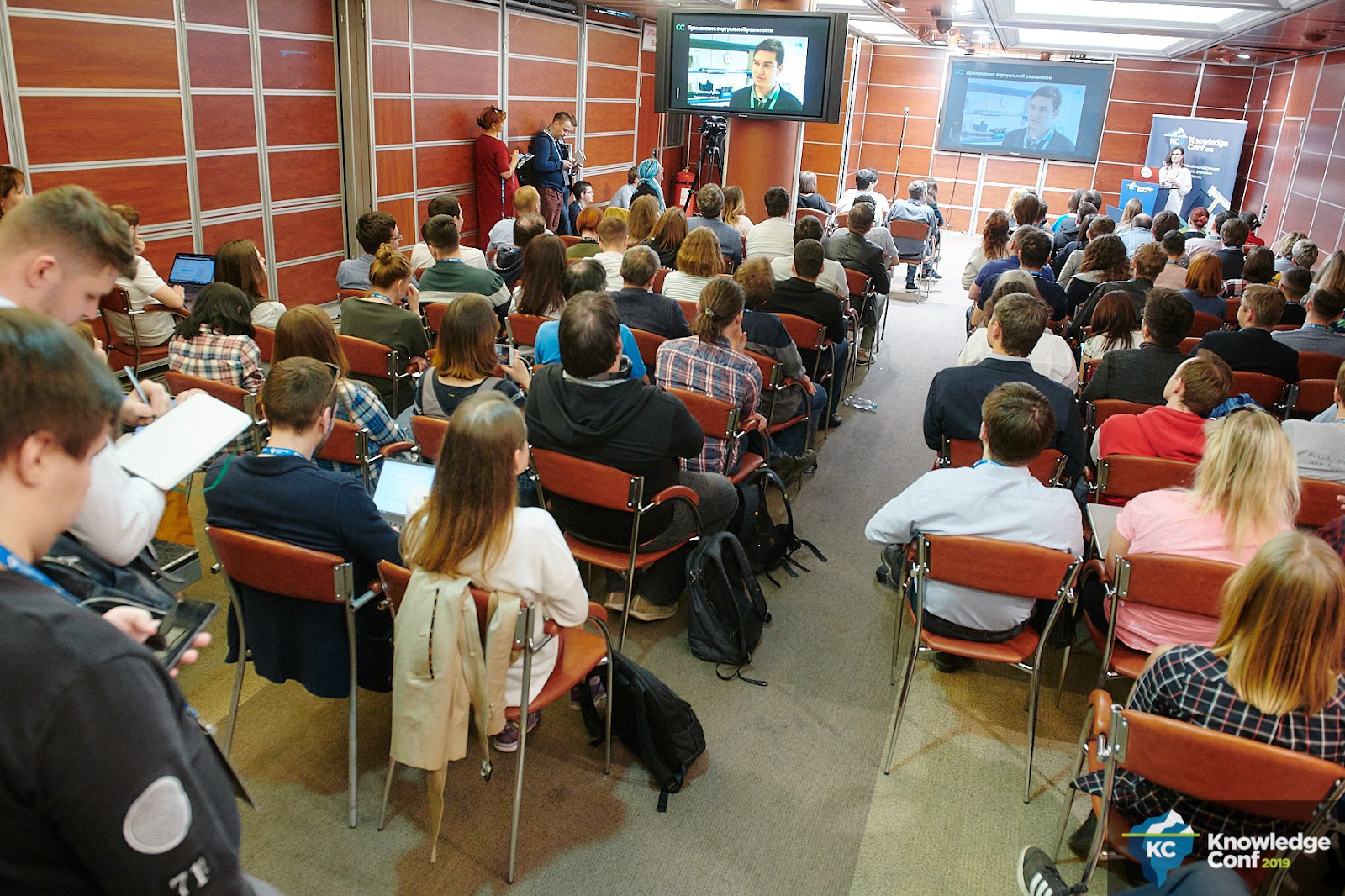
- Did you manage to cover all aspects? What is it worth to talk about next time?
Of course, you cannot cover all aspects in one day. The scope is very vast. For 24 report slots, we had 83 applications. You understand how many speakers had to refuse.
Of course, a number of aspects remained behind the scenes. For example, I really didn’t have enough reports from manufacturers of knowledge management software (yes, there are such) on how they identify what is needed for effective knowledge management, what research is based on, etc.
It is imperative that you expand on the topic of evaluating the return on investment from KM, assessing the effectiveness of KM and the staff responsible for this. This will help us ourselves to understand the importance of KM, it is easier to promote ideas in our companies and understand our place in the company’s business. There were a couple of reports on this at this conference, but this question, in principle, is very poorly worked out. Therefore, even two reports are very few for some completeness.
- Which reports, in your opinion, were the most useful?
My favorite is Alexei Sidorin. His report was filled with a huge amount of practice, approaches, rakes and artifacts. The presentation of this presentation can now be found on the conference website. By the way, we also posted the presentations of other speakers a long time ago.
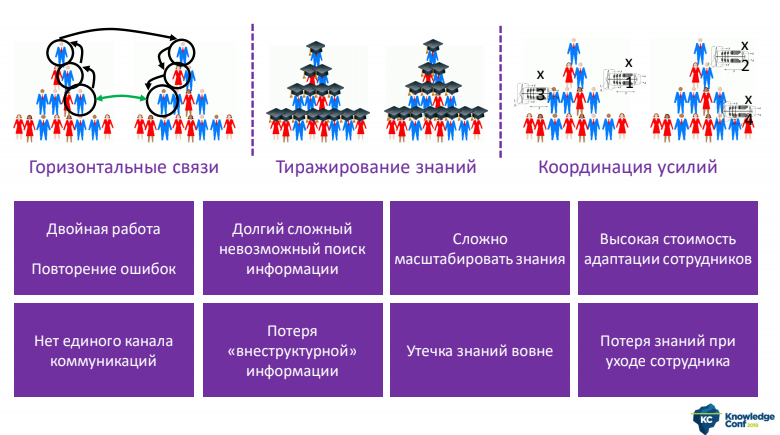
In addition to him, the report by Alexander Orlov from Stratoplan and the absolutely wonderful story of Roman Khorin that a tool for a knowledge management system should be chosen based on the real needs of the team did not go very well and it was not necessary to buy an expensive solution for this.

In general, with such a competition, it would not be physically possible for the program to accommodate even one weak or useless report, so all of them were good. I think each of them has found its audience and brought someone benefit.
- What topics and reports attracted the largest audience?
I moderated the Oxford Hall, so I can only say for sure about it. These were the reports of Alexei Sidorin , Alexei Petrov , Grigory Petrov . The remaining reports also included quite a few listeners. Judging by the reviews of colleagues from the PC, in other rooms it was also hot, and we were surprised at such an influx of visitors.
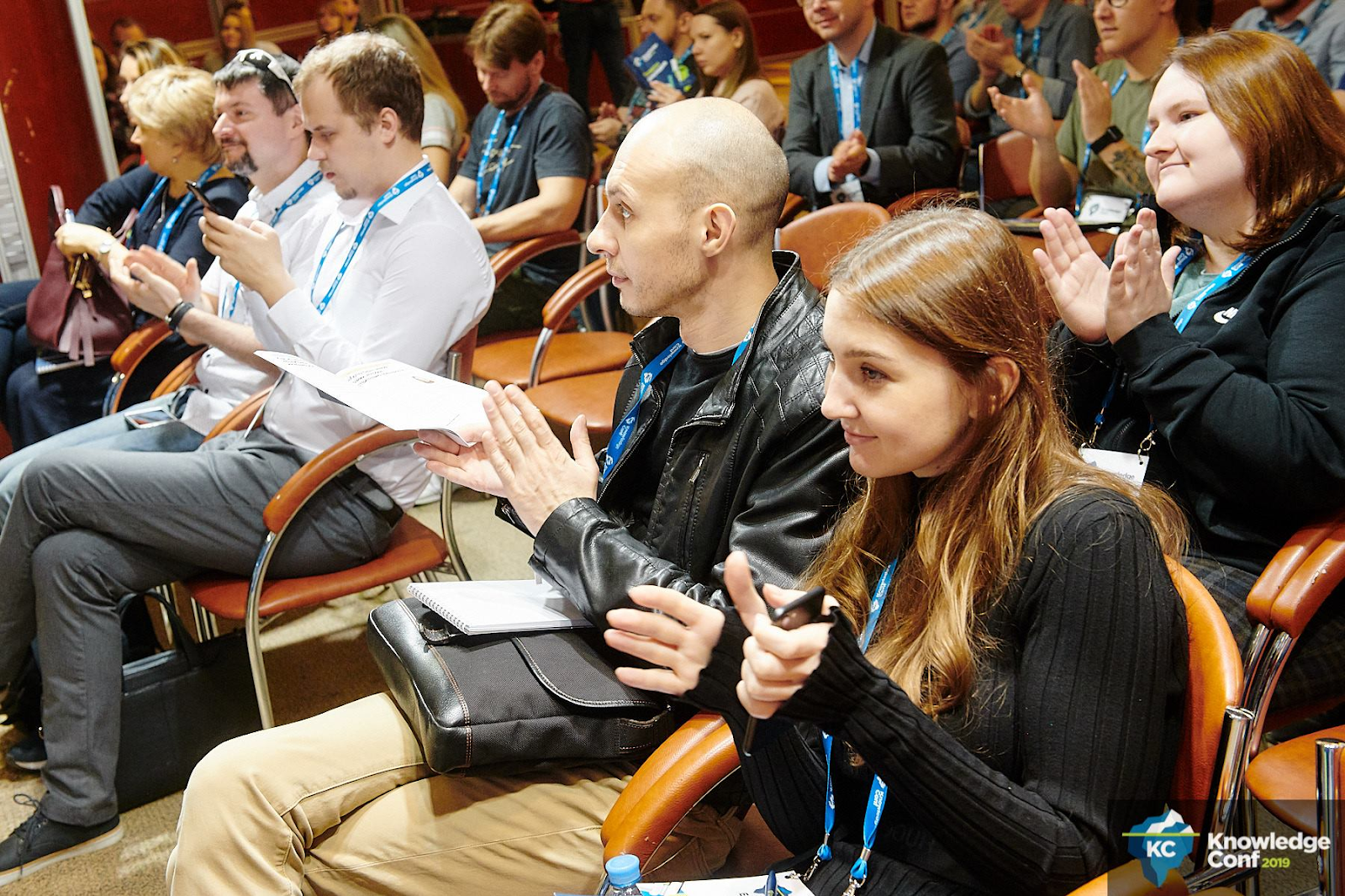
- Were there any interesting examples or thoughts that could be “implemented right here and now”?
PC and I generally tried to direct all speakers as far as possible towards practice. So that listeners can really just take and do. The same adaptation checklists for onboarding a beginner from Alexei Petrov or daily additional training of a new shift of technical support on cases of previous shifts from Alexander Solovyov.
- What did you personally find the most interesting?
Personally, I liked the fact that we brought together on the same platform people of completely different formations and mentalities: direct UZ professionals, for whom it is a lifestyle, people from the academic sector, commerce, coaching, enthusiastic developers who took up UZ to solve the specific problem of their department ... We gathered them and gave the opportunity to share experiences, transfer knowledge, learn to understand each other. From this, in the future, we can get the coolest trade union, where the different views and competencies of the participants will lead to the most unexpected decisions and discoveries.
I myself deal directly with knowledge management, and communicating on a PC with developers, who for me are usually the target audience, their understanding of knowledge management, was a huge discovery. I still can’t digest it, because I, from my bell tower, presented it all in a completely different way. And the ability to understand your target audience is one of the keys to effective knowledge management.
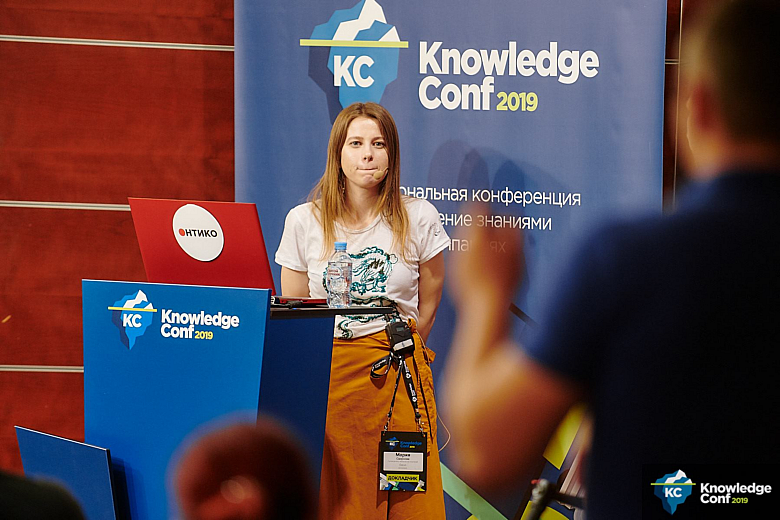
- You presented your report “ Knowledge Management in the Rapid Growth of a Company ”. Did you like the conference as a speaker?
Oh sure.
- How was the preparation of the report with the program committee? How much has your story changed?
We had two test runs with members of the program committee, during which the organizers watched whether my story was suitable for the format of the conference, whether it was necessary to expand some parts, to supplement the information. Both times I received feedback from them and recommendations for revision. In addition, there were calls with a trainer who helped add a little bit of substance. It initially seemed to me that some things should not be told, but he recommended nevertheless to dwell on them to show why such solutions were used.
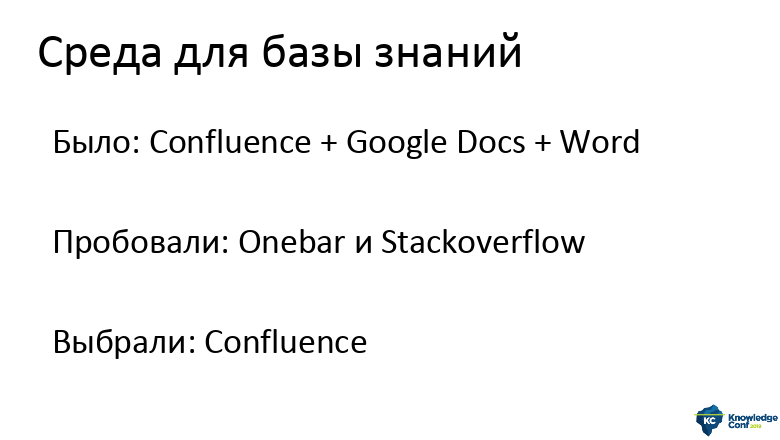
The general line of the story remained unchanged, but in the course of this work almost the entire ending and some details appeared in the report itself.
- And what was the audience’s reaction?
The topic aroused keen interest. There were so many questions.
In general, the report was about our specific timeline - what exactly we did, how our processes changed and why, what we came to in six months. Therefore, unfortunately, I did not have an answer to some of the audience’s questions. They concerned some specific situations to which we have not yet grown. When we start working with a large number of teams, perhaps the questions asked will be relevant for us, and we will find answers to them.
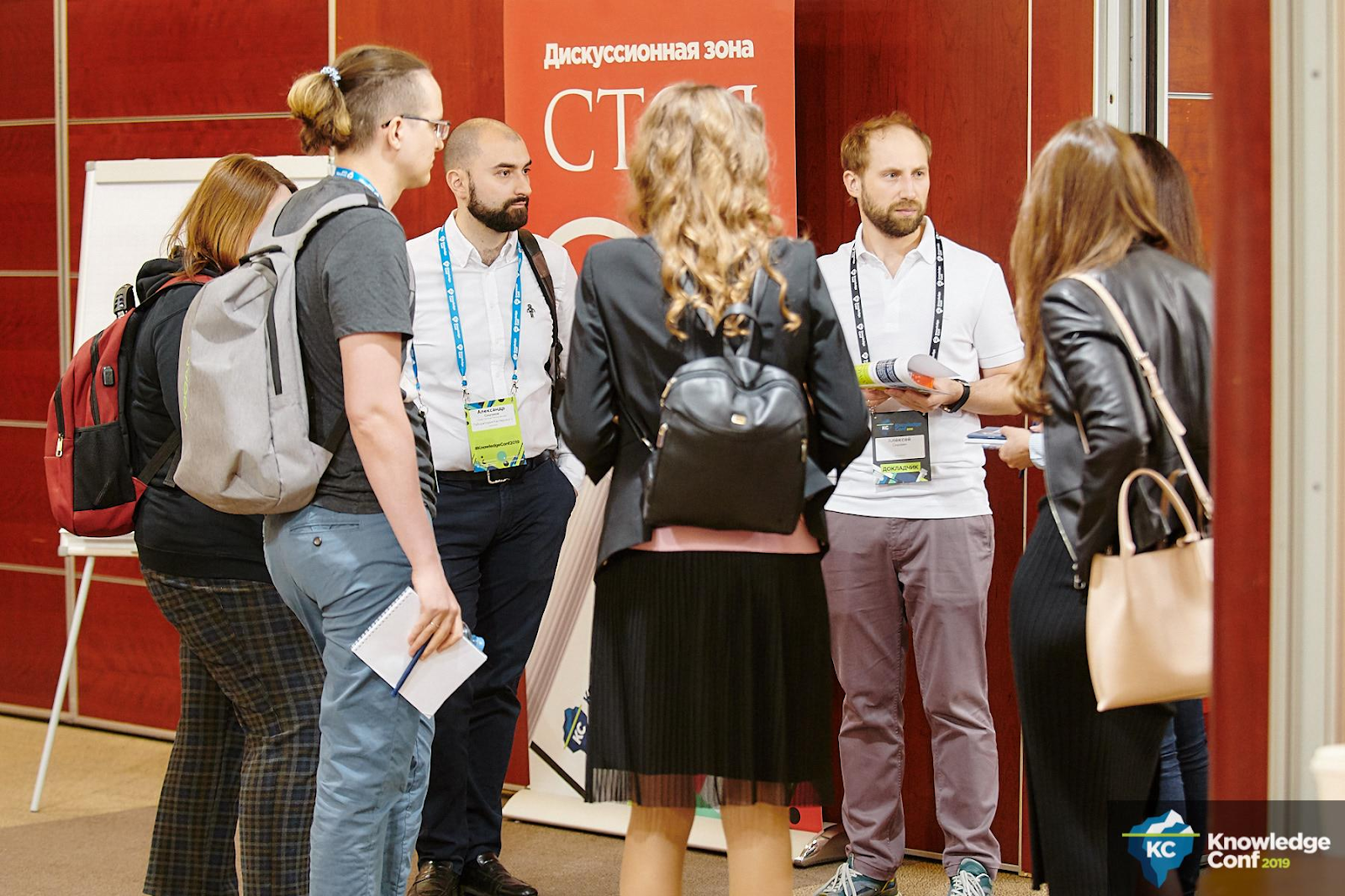
- And as a viewer, what topics were of interest to you at the conference?
I went to KnowledgeConf to see how other companies rate this process. Traditionally, this topic is least disclosed, since people share some specific experience - what and how they did. But very little is said about the assessment.
- What reports were most remembered?
I liked the large and rich report of Alexei Sidorin from Krok (“Holistic knowledge management in an IT company”). They have an entire knowledge management system built very richly. There are various chatbots, and staff, and interactions between HRs, and IT solutions that they have already established.
It was interesting to listen precisely because of the abundance of instruments, because we are just getting started. I want to implement their ideas, because there is already experience - how the company did it.
Also fromBIOCAD report I got the idea of tagging information and role models of employees. And also about the bot chat (in different versions, about three of the five reports I listened to about the bots).
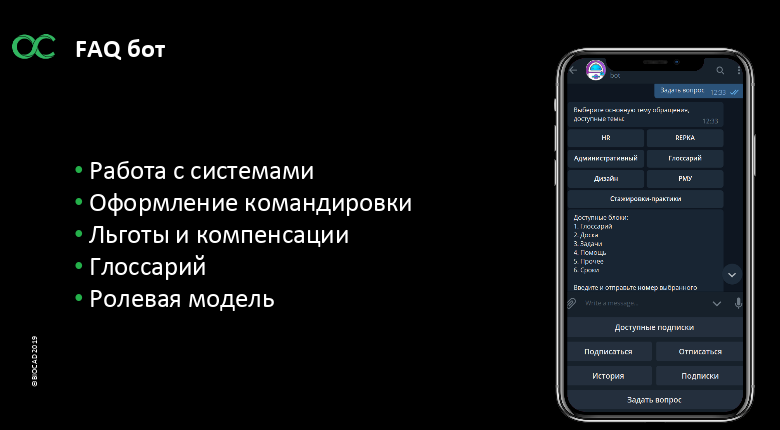
- What impressed you most on KnowledgeConf?
I met a huge number of people. Most of all I liked to participate in interactive programs. At the meeting of Igor Tsupko “Technologies of the future for knowledge management: a collective dreaming session”, we dreamed of cool tools that could solve all our problems related to collecting knowledge or onboarding new employees. And Rodion Nagornov taught us how to "sell" the idea of knowledge management to his colleagues, and most importantly - to management. It was especially interesting.
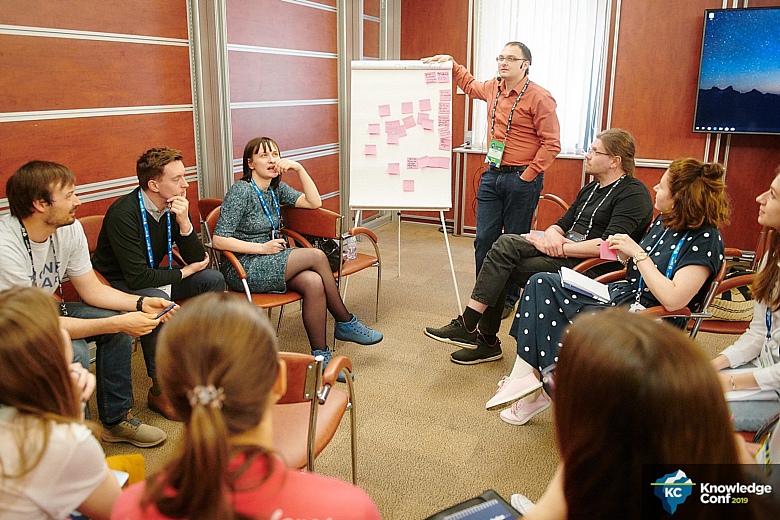
- Were ideas ready for implementation voiced at the meetings?
Such ideas were more likely in the reports. For example, there was a report by Gleb Deikalo " Welcome aboard: introducing new developers to the team"in which he talked about the whole onboarding system created in Badoo. Thanks to this system, beginners can quickly immerse themselves in work processes.
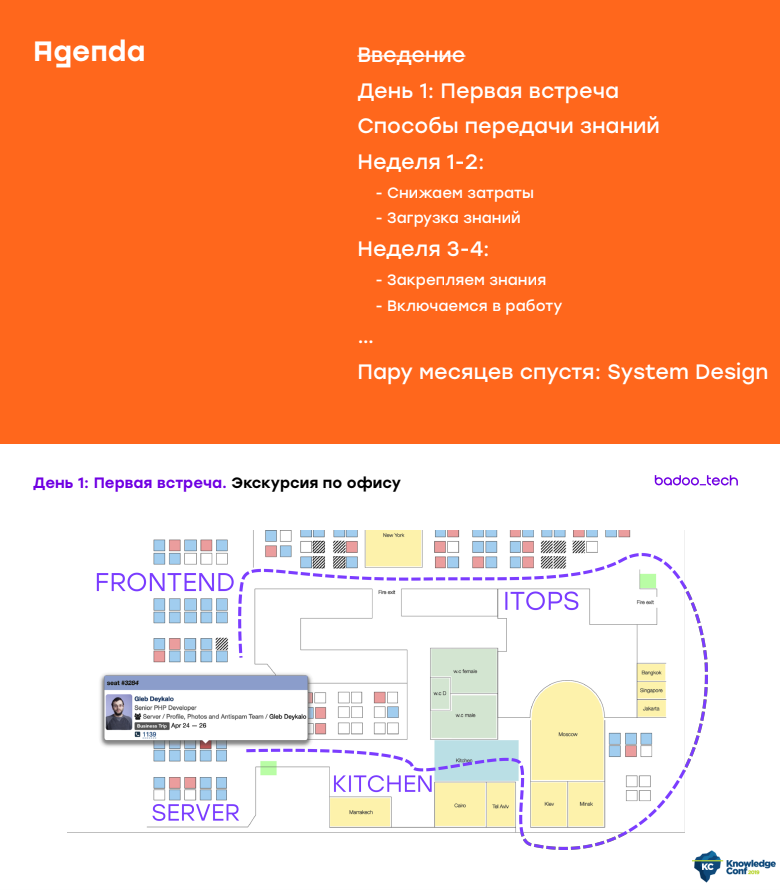
I really liked the approach by which he got rid of the routine. And when I returned from the conference, I introduced the initial stage of a similar system for interns. My implementation, of course, is not as sophisticated as that of Gleb. In fact, I took from him the very idea of a system with certain steps that I launched in Trello. There I have scripts for immersing interns in which there are links ki for all the available documentation. And it helps a lot to keep things up to date.
”“ And do you recall any interesting stories?
I am delighted with the idea of SkyEng, who implemented a team consisting entirely of June in their company. They talked about this in the report, "The Skyeng Developer Incubator. Why did we hire a whole junior department? " Unfortunately, I could not take anything from their story - we have different processes. But the experience itself is extremely interesting. Their team took off despite the fact that some participants fell off over time.
- What topics were missing in the program?
It seems to me that at the meetings we managed to talk about everything at all. In general, I really liked it: they covered the most important thing that hurts the most.
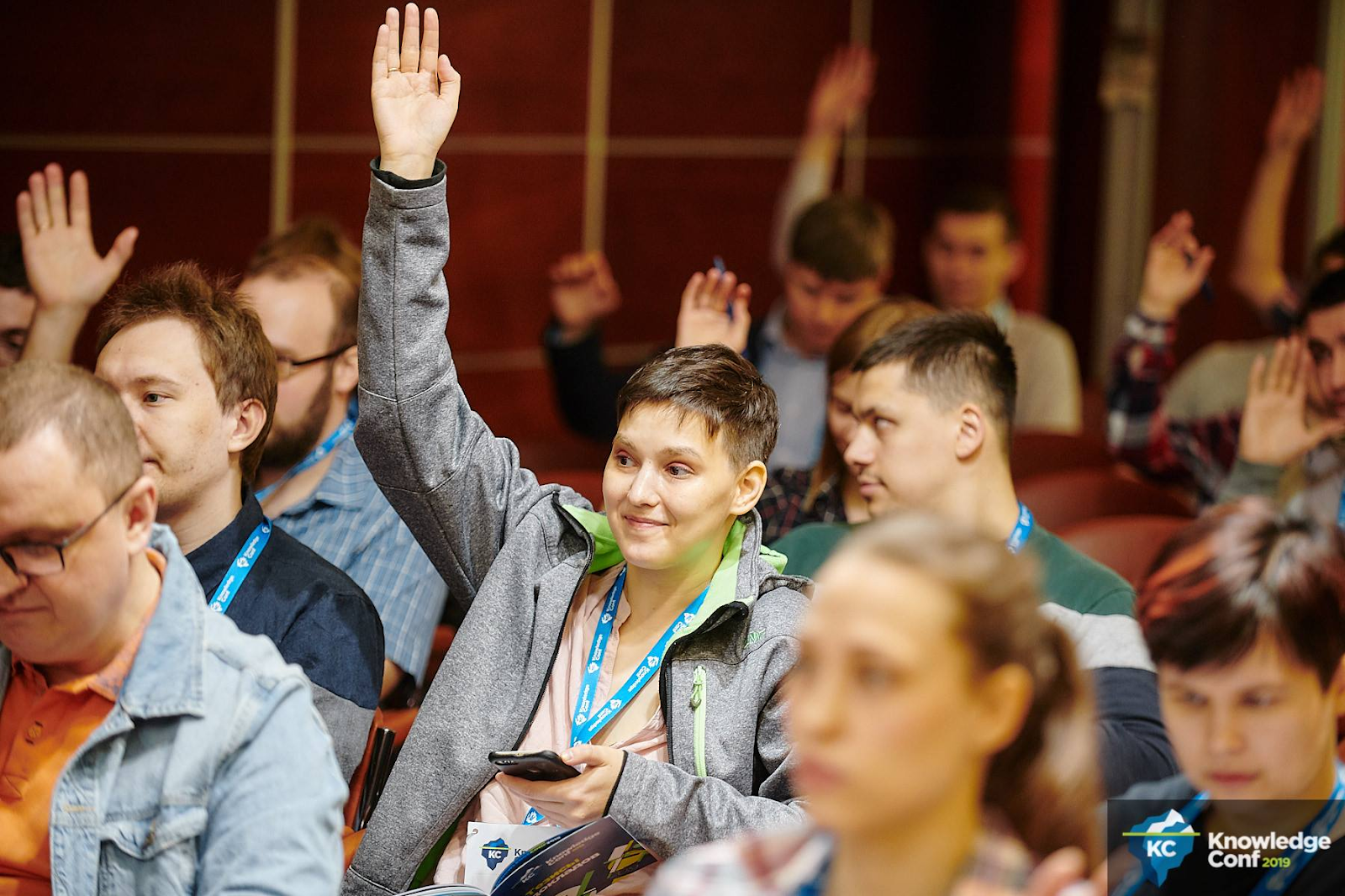
- Were there any wishes for the organizers of the conference?
I would like to wish you, as the organizers, even more coverage so that you can expand the circle of acquaintances on this topic.
Under the cut, a look at the event through the eyes of a member of the program committee, conference speaker and a simple participant: about top reports, a heavy share of the speaker and practical chips that we managed to get for ourselves from the event.

Rodion Nagornov is the head of the training and certification group at Kaspersky Lab, as well as a member of the KnowledgeConf 2019 program committee

- Did the public interest in the conference live up to your expectations?
It so happened that for me it was the third conference on knowledge management in three weeks, so there is nothing to compare. I will say this: the interest of the IT audience on this topic exceeded my expectations, since the attendance of Knowledge Conf turned out to be much higher than the previous two conferences positioned by their organizers for a wider audience.
To gather three practically full halls in parallel, plus being able to hold a meeting for 20 people is cool. At the same time, there remained those who continued to communicate on the sidelines while the performances were on.

In my personal opinion, knowledge management is a very important process in any company. What can we say about IT, where everything changes at a tremendous speed: from programming languages to personnel. And I am very glad that so many colleagues share this opinion.
- How would you rate the maturity of the entire knowledge management industry in our country?
Large corporations in the public sector, the oil industry, have a fully mature knowledge management process, actively cooperate with foreign leaders, and learn from experience. They have a lot to learn. In the commercial segment, one cannot say for sure. Very heterogeneous. There is a CROC close to ideal, for example. But this is rather the exception. For the most part, companies are just beginning to realize that knowledge is their key capital, that developing knowledge sharing processes is vital for success in a rapidly changing environment. What is better for the whole company to learn from one mistake than to lose money on the same mistakes of each department.
It seems to me that the emergence of a separate conference on knowledge in IT is a kind of marker that the knowledge management industry will soon see a leap in development.
But while this is the stage of acceptance of the idea and primary research.

- Did you manage to cover all aspects? What is it worth to talk about next time?
Of course, you cannot cover all aspects in one day. The scope is very vast. For 24 report slots, we had 83 applications. You understand how many speakers had to refuse.
Of course, a number of aspects remained behind the scenes. For example, I really didn’t have enough reports from manufacturers of knowledge management software (yes, there are such) on how they identify what is needed for effective knowledge management, what research is based on, etc.
It is imperative that you expand on the topic of evaluating the return on investment from KM, assessing the effectiveness of KM and the staff responsible for this. This will help us ourselves to understand the importance of KM, it is easier to promote ideas in our companies and understand our place in the company’s business. There were a couple of reports on this at this conference, but this question, in principle, is very poorly worked out. Therefore, even two reports are very few for some completeness.
There were not enough cases about a bunch of knowledge management systems and staff training. We talked separately about onboarding, separately about mentoring, but that I can only build on these processes based on the knowledge gathered within the company, one report-case.
- Which reports, in your opinion, were the most useful?
My favorite is Alexei Sidorin. His report was filled with a huge amount of practice, approaches, rakes and artifacts. The presentation of this presentation can now be found on the conference website. By the way, we also posted the presentations of other speakers a long time ago.

In addition to him, the report by Alexander Orlov from Stratoplan and the absolutely wonderful story of Roman Khorin that a tool for a knowledge management system should be chosen based on the real needs of the team did not go very well and it was not necessary to buy an expensive solution for this.

In general, with such a competition, it would not be physically possible for the program to accommodate even one weak or useless report, so all of them were good. I think each of them has found its audience and brought someone benefit.
- What topics and reports attracted the largest audience?
I moderated the Oxford Hall, so I can only say for sure about it. These were the reports of Alexei Sidorin , Alexei Petrov , Grigory Petrov . The remaining reports also included quite a few listeners. Judging by the reviews of colleagues from the PC, in other rooms it was also hot, and we were surprised at such an influx of visitors.

- Were there any interesting examples or thoughts that could be “implemented right here and now”?
PC and I generally tried to direct all speakers as far as possible towards practice. So that listeners can really just take and do. The same adaptation checklists for onboarding a beginner from Alexei Petrov or daily additional training of a new shift of technical support on cases of previous shifts from Alexander Solovyov.
When the recordings of reports appear in the access, I highly recommend reviewing and re-listening them all. Each of them has at least one practice that you can start implementing in your workflow today.
- What did you personally find the most interesting?
Personally, I liked the fact that we brought together on the same platform people of completely different formations and mentalities: direct UZ professionals, for whom it is a lifestyle, people from the academic sector, commerce, coaching, enthusiastic developers who took up UZ to solve the specific problem of their department ... We gathered them and gave the opportunity to share experiences, transfer knowledge, learn to understand each other. From this, in the future, we can get the coolest trade union, where the different views and competencies of the participants will lead to the most unexpected decisions and discoveries.
I myself deal directly with knowledge management, and communicating on a PC with developers, who for me are usually the target audience, their understanding of knowledge management, was a huge discovery. I still can’t digest it, because I, from my bell tower, presented it all in a completely different way. And the ability to understand your target audience is one of the keys to effective knowledge management.
Maria Smirnova, head of the group of technical writers Ozon.ru - one of the speakers

- You presented your report “ Knowledge Management in the Rapid Growth of a Company ”. Did you like the conference as a speaker?
Oh sure.
- How was the preparation of the report with the program committee? How much has your story changed?
We had two test runs with members of the program committee, during which the organizers watched whether my story was suitable for the format of the conference, whether it was necessary to expand some parts, to supplement the information. Both times I received feedback from them and recommendations for revision. In addition, there were calls with a trainer who helped add a little bit of substance. It initially seemed to me that some things should not be told, but he recommended nevertheless to dwell on them to show why such solutions were used.

The general line of the story remained unchanged, but in the course of this work almost the entire ending and some details appeared in the report itself.
- And what was the audience’s reaction?
The topic aroused keen interest. There were so many questions.
In general, the report was about our specific timeline - what exactly we did, how our processes changed and why, what we came to in six months. Therefore, unfortunately, I did not have an answer to some of the audience’s questions. They concerned some specific situations to which we have not yet grown. When we start working with a large number of teams, perhaps the questions asked will be relevant for us, and we will find answers to them.

- And as a viewer, what topics were of interest to you at the conference?
I went to KnowledgeConf to see how other companies rate this process. Traditionally, this topic is least disclosed, since people share some specific experience - what and how they did. But very little is said about the assessment.
- What reports were most remembered?
I liked the large and rich report of Alexei Sidorin from Krok (“Holistic knowledge management in an IT company”). They have an entire knowledge management system built very richly. There are various chatbots, and staff, and interactions between HRs, and IT solutions that they have already established.
It was interesting to listen precisely because of the abundance of instruments, because we are just getting started. I want to implement their ideas, because there is already experience - how the company did it.
Also fromBIOCAD report I got the idea of tagging information and role models of employees. And also about the bot chat (in different versions, about three of the five reports I listened to about the bots).

Olga Ilchukova, Technical writer, GAU RK “Center for Information Technologies” - visitor of the conference
- What impressed you most on KnowledgeConf?
I met a huge number of people. Most of all I liked to participate in interactive programs. At the meeting of Igor Tsupko “Technologies of the future for knowledge management: a collective dreaming session”, we dreamed of cool tools that could solve all our problems related to collecting knowledge or onboarding new employees. And Rodion Nagornov taught us how to "sell" the idea of knowledge management to his colleagues, and most importantly - to management. It was especially interesting.

- Were ideas ready for implementation voiced at the meetings?
Such ideas were more likely in the reports. For example, there was a report by Gleb Deikalo " Welcome aboard: introducing new developers to the team"in which he talked about the whole onboarding system created in Badoo. Thanks to this system, beginners can quickly immerse themselves in work processes.

I really liked the approach by which he got rid of the routine. And when I returned from the conference, I introduced the initial stage of a similar system for interns. My implementation, of course, is not as sophisticated as that of Gleb. In fact, I took from him the very idea of a system with certain steps that I launched in Trello. There I have scripts for immersing interns in which there are links ki for all the available documentation. And it helps a lot to keep things up to date.
”“ And do you recall any interesting stories?
I am delighted with the idea of SkyEng, who implemented a team consisting entirely of June in their company. They talked about this in the report, "The Skyeng Developer Incubator. Why did we hire a whole junior department? " Unfortunately, I could not take anything from their story - we have different processes. But the experience itself is extremely interesting. Their team took off despite the fact that some participants fell off over time.
- What topics were missing in the program?
It seems to me that at the meetings we managed to talk about everything at all. In general, I really liked it: they covered the most important thing that hurts the most.

- Were there any wishes for the organizers of the conference?
I would like to wish you, as the organizers, even more coverage so that you can expand the circle of acquaintances on this topic.
